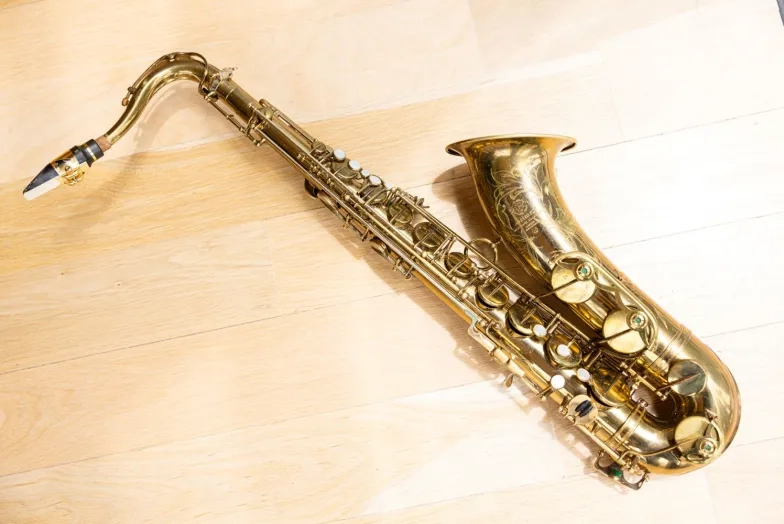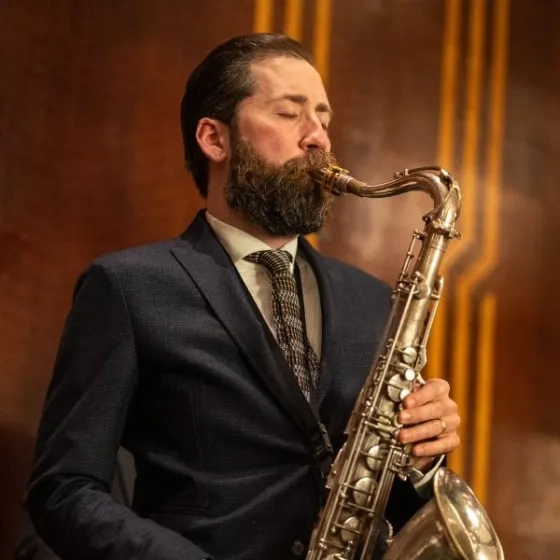Student Recital


5:00 PM

Courses Taught
Applied Lessons
Jazz Seminar
Jazz Theory and Composition
Jazz Icons of the 20th Century
Education
BM, New York University
Ensembles
Marcus Shelby Jazz Orchestra (2011-)
Diana Gameros Group (2011-)
Patrick Wolff quartet, quintet, and sextet (2010-)
What is your hometown?
Syracuse, NY
What is your favorite recording? Why?
"Currently a tie- Jascha Heifetz's version of the Sibelius Violin Concerto with the Chicago Symphony Orchestra- for his balance of precision and passion, and the rhythmic drive that animates this brilliant work...and the sound of the recording is a classic example of the richness of early stereo recordings.
Charlie Parker's ""One Night at Birdland""- if you can get past the recording quality, I think this may be the most intricate, broad, adventurous, and terrifyingly virtuosic demonstration of the bebop language ever documented."
What are you passionate about outside of music?
My family, vintage and DIY hi-fidelity gear, cinema, great novels, surfing
Who were your major teachers?
Barry Harris, Ralph Lalama, Frank Kimbrough
What is a favorite quote that you repeatedly tell students?
To be a real jazz musician, you must choose which musical elements are rules, and which are considerations.
What question do you wish students would ask sooner rather than later?
How do I organize my approach to practicing?
What was the defining moment when you decided to pursue music as a career?
When I was 14, I saw a jam session at a hotel near where a jazz festival was happening, and I realized that if jazz musicians do the exact same thing when they are done with work as they do when they're working, then that must be a pretty worthwhile career.
If you weren't a musician or teacher, what do you think you would be doing now?
Lobbying for housing solutions for the victims of the economic warfare that we consider normal in this country, and the soon-to-grow number of refugees from climate change.
What is your daily practice routine?
Its different every day now that I teach and have young children, but I always do tone excercises first, then a mix of learning repertoire for upcoming gigs, transcribing arrangements, some etudes to keep my fingers limber, playing Bach, and free improvisation.
If you could play only three composers for the rest of your life, who would they be?
Bach, Monk, and Cole Porter
From a music history perspective, what year and city are most important to you, and why?
1945 in New York City saw a coalescence of the great early improvisers of jazz with the revolutionaries of bebop, and the modern idioms that came out of this moment laid the groundwork for all of my favorite jazz, continuing into present times. It shows what happens when you combine a culture of intellectual curiosity and disciplined work with a good dose of hedonism in a geographic pressure cooker, great things happen.
What do you think makes a concert experience unique?
The complexities of acoustic live sound in a great concert are still more engaging and stimulating than any of the reproduced or synthesized attempts to replace this rite. The more time humans spend online, disassociating from their communities and directly lived experience, the more potent and important it becomes to share the sympathetic vibrations and spiritual energy of attentive listening that one finds as an audience member. To me, live music with a good audience, especially music which involves improvisation, is the most elevated form of human communication.
What recordings can we hear you on?
-Patrick Wolff Sextet- ""Noose Of Light"" (Big Bad Records, 2013)
-Richard Sears/Tootie Heath- “Altadena”- tenor saxophone (Ropeadope, 2016)
-Diana Gameros- “Arrullo”-tenor saxophone, clarinet (2017)
-Adam Shulman- “Full Tilt”-tenor saxophone (Cellar Live, 2018)
-Marcus Shelby- “Transitions”-tenor saxophone, clarinet (MSO Records, 2019)
Patrick Wolff is a saxophone and clarinet player with a long history in the jazz scenes of New York City and San Francisco. He has performed or recorded with Albert ""Tootie"" Heath, Matt Wilson, Grant Stewart, Louis Moholo-Moholo, Dena Derose, and many other jazz greats. Since moving to San Francisco in 2009, Wolff has played and recorded regularly in the bands of Marcus Shelby, Richard Sears, Graham Connah, Adam Shulman, and Diana Gameros. Outside of the jazz world, he has had an eclectic mix of work including long stints in West African pop/funk group Asiko, prog metal band Kayo Dot, and with fuji music legend Adewale Ayuba. With six albums released under his name, Wolff has made his mark as a bandleader with various groups playing his original compositions, and with classic jazz quartets and quintets focused on repertoire of the bebop and hard bop eras. His playing is characterized by a focus on lyricism and an embrace of the whole lineage of jazz styles.
Wolff is also a passionate jazz educator and advocate. For four years, he hosted and produced a weekly fearure show on KCSM 91.1FM (""Have You Heard""), exploring the work of emerging and underrated jazz artists, and continues to dj for the station on occasion. He was the Faculty Director at the Stanford Jazz Workshop from 2008-2013, and currently teaches jazz history, composition, and ensemble classes at the San Francisco Conservatory of Music and the College of San Mateo throughout the year, and at the Stanford Jazz Workshop in the summer.
Performances with Patrick Wolff
View Performance Calendar